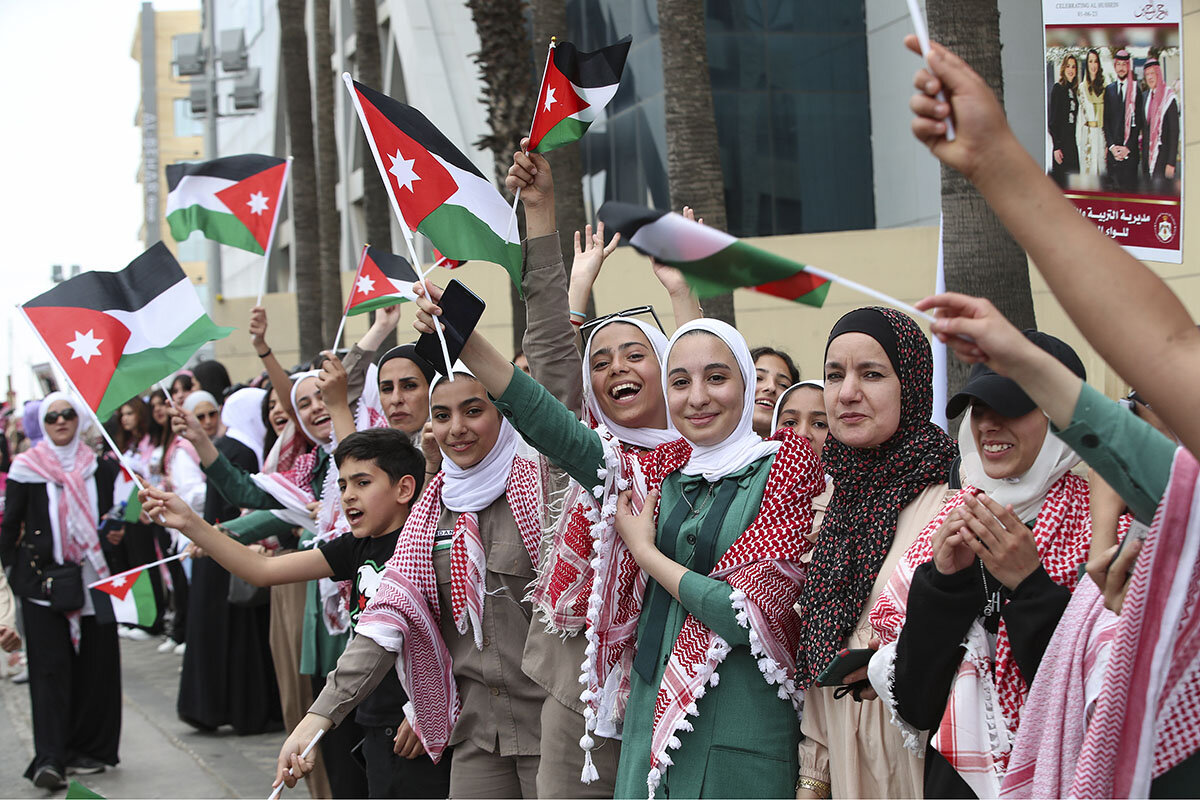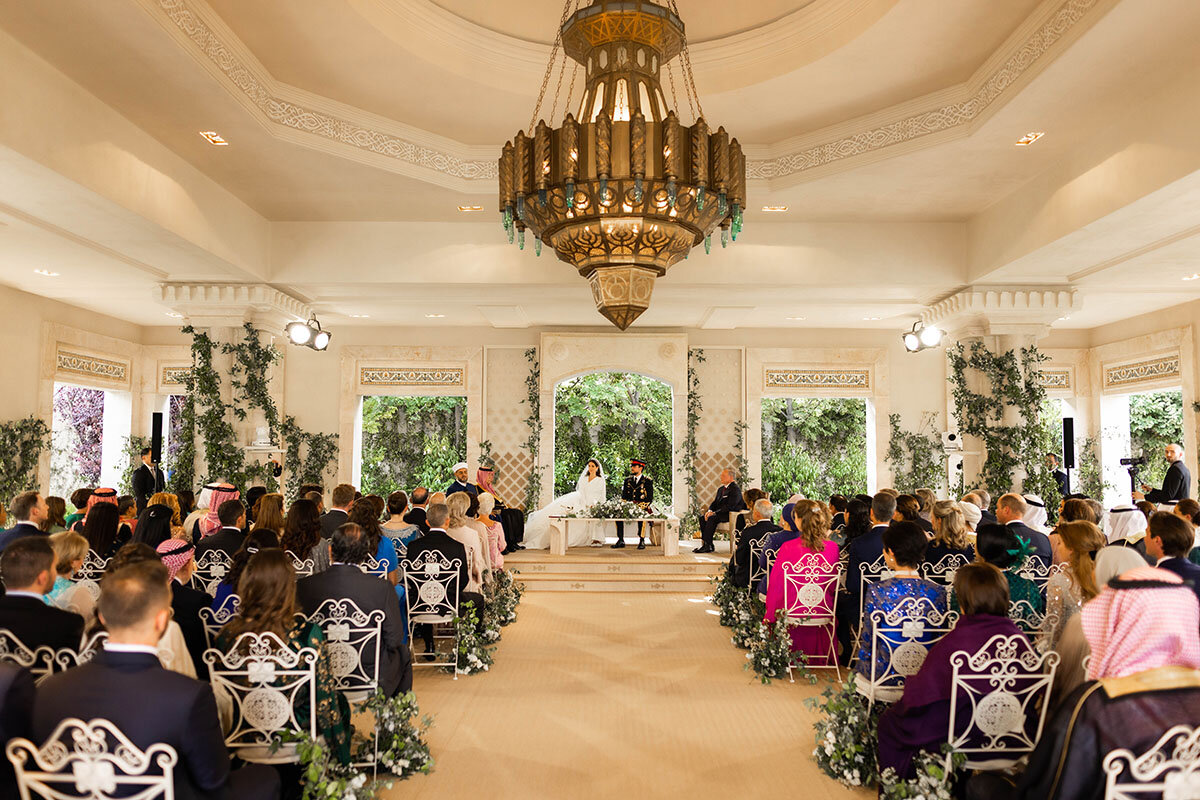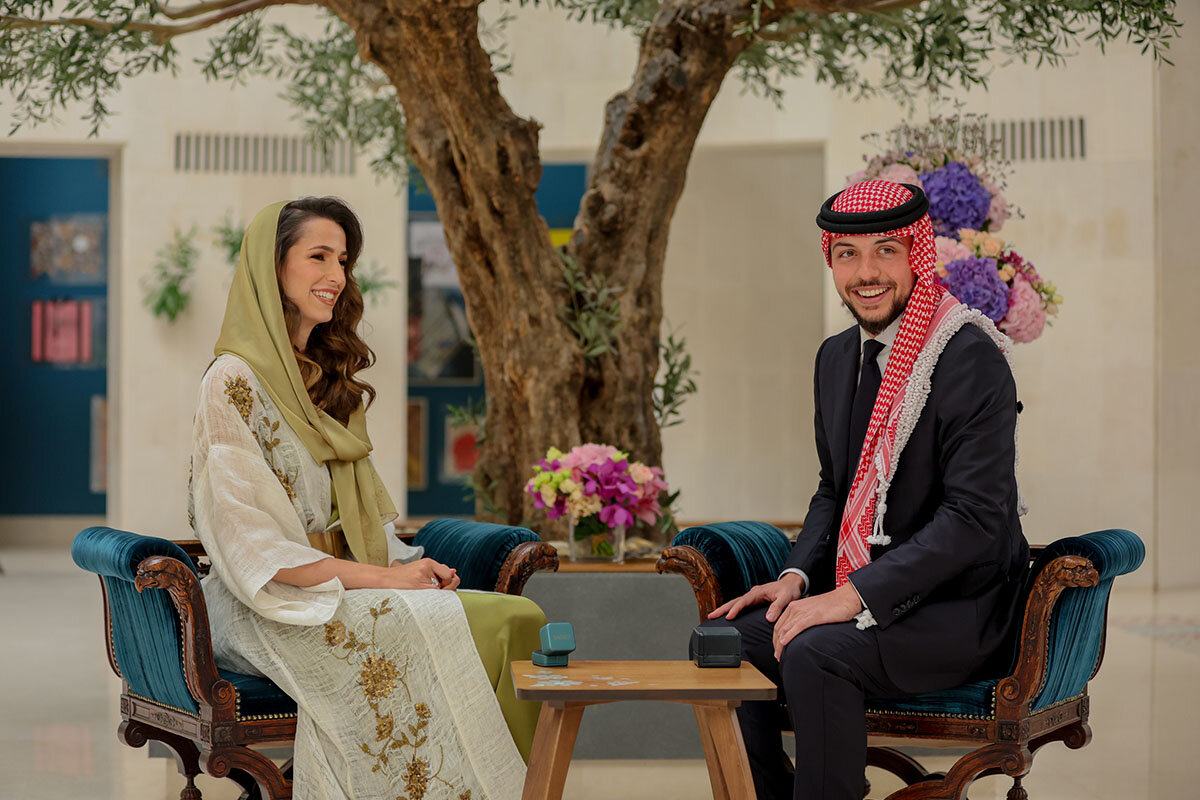Jordan’s royal wedding: Joy, politics, and an eye toward the kingdom’s future
Loading...
| Amman, Jordan
A national holiday, free concerts, air shows, bagpipers, world leaders, a shuttered capital – the wedding of Jordan’s Crown Prince Hussein on Thursday was not your typical royal wedding.
More than nuptials with a who’s who of VIP guests, these public celebrations, according to Jordan’s royal palace, were “the big event.” They’re the introduction to Jordan’s next king.
“Today we are rejoicing for our future,” says Mohammed Sawaya, one of thousands of citizens on Amman’s streets waiting for the royal procession to pass after today’s wedding ceremony. Nearby, his car sports a giant decal of the crown prince and his bride.
“Prince Hussein is our age, he understands youth issues, he can navigate the world, and he is going to lead us into the future,” Mr. Sawaya says. More than half of Jordanians are under the age of 30.
The wedding of the crown prince to Rajwa Alseif, a Saudi architect and cousin of the Saudi ruling family, was a break from tradition in Jordan where, unlike the United Kingdom, royal weddings have long been low-key affairs.
They were the largest celebrations the country has seen in two decades. The weeklong festivities kicked off on Monday with free concerts and dabkeh line dances at companies and university campuses, and in village squares.
Scarlet banners and electronic billboards dotted across the capital bear the words “celebrating Hussein,” “the royal wedding,” and, simply, “we rejoice.” Even McDonald’s put up a three-story banner with the crown prince’s image, announcing that the burger chain was “rejoicing in Hussein.”
On Thursday, schools and businesses shuttered, and one-third of the capital’s streets closed to mark the occasion. In a country whose stability has long been tied to its royal family, the point was clear: “The main message of these celebrations is the presentation of the future king of Jordan,” says Amer Al Sabaileh, a Jordanian geopolitical analyst.
Although King Abdullah II has declared no intention of stepping aside, his 28-year-old son, Crown Prince Hussein, has been increasingly assuming official royal duties.
He’s deputized for his father abroad by addressing the U.N. General Assembly, attending Arab League summits, and being received along with the king by President Joe Biden at the White House in April. Yet, until this week, the heir-in-waiting had not yet stepped into the limelight at home.
In Jordan, the crown prince, a Georgetown graduate, is best known for his Crown Prince Foundation, a nonprofit that runs youth empowerment and employability skills initiatives.
Along with the national holiday, this week Crown Prince Hussein was given his own royal flag and emblem, a sign Mr. Sabaileh says means he could soon become a “crown prince with a wider portfolio and involvement in day-to-day affairs,” and perhaps “a de facto king of Jordan.”
Thursday was a rare moment of joy for the traditionally stable and steadfast monarchy, a stalwart U.S. ally that has faced geopolitical and internal tumult over the past five years.
King Abdullah resisted pressure by Saudi Crown Prince Mohammed bin Salman and the Trump administration to support a controversial peace plan that would have failed to guarantee Palestinian statehood and would have stripped away Palestinian refugees’ right of return.
And Jordan’s monarch is two years removed from an alleged coup attempt by his half-brother, former Crown Prince Hamzah, in a “sedition” case that officials claim was orchestrated by foreign powers to replace King Abdullah.
International dignitaries, royalty, and regional leaders were in attendance today for the soft launch of a future monarch, including first lady Jill Biden; Prince William and his wife, Kate; Kuwaiti Crown Prince Mishal Al Sabah; and Iraqi President Abdul Latif Rashid.
The nationwide celebrations were a message to Jordanians as well as neighbors, allies, and foes: The future is secure, and that future is Crown Prince Hussein.
“Having the international community present was a way to close the chapter of the recent disputes and put very clear that this crown prince is the coming king,” says Mr. Sabaileh, the analyst.
In a press release, Jordan’s Hashemite Royal Court described the wedding as a “touchstone in the country’s century-long story” providing “the Jordanian people with an opportunity to come together around a joyous occasion ... and look to the future of their country with pride.”
The wedding “lays the foundation for the next generation of the Royal Family and the perpetuation of the Jordanian Hashemite line,” which traces its roots back to the Prophet Muhammad, the statement added.
It also sealed a match of political expediency.
Through her mother, Ms. Alseif is a first cousin twice removed from Saudi Arabia’s King Salman and a second cousin to the ruling Crown Prince Mohammed bin Salman.
There is hope among some officials and Jordanians that marital ties between the future king and the Saudi royal family will preserve the kingdom’s place in a region increasingly dominated by rising Saudi leadership and waning American influence.
Watching the wedding on giant screens near the royal palace, Jordanian brothers Mohammed Abu Eid and Omar Abu Eid stand side by side wrapped in Jordanian and Saudi flags.
“We Jordanians and Saudis are relatives now,” Mohammed says. “Our future is together.”










